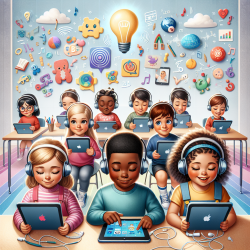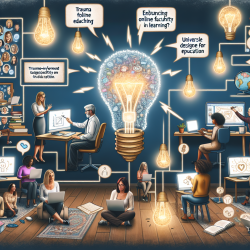Introduction
In the field of speech-language pathology, the integration of soft skills is as crucial as the technical knowledge we impart. The historical journey of German-speaking émigré neuroscientists, as detailed in the research article "Learning Soft Skills the Hard Way," provides invaluable insights into the cultural adaptation and integration processes that can inform our practice today. This blog explores how these lessons can enhance our professional development and improve outcomes for the children we serve.
The Historical Context
The article by Frank W. Stahnisch examines the experiences of German-speaking neuroscientists who emigrated to Canada between 1933 and 1963. These individuals faced the daunting task of adjusting to new cultural and professional environments. Despite their expertise, they had to develop soft skills to navigate the complex social and cultural landscapes of their new home. This process was not only about transferring knowledge but also about adapting to new social norms and professional practices.
Lessons for Speech-Language Pathologists
As speech-language pathologists, we can draw several lessons from the experiences of these émigré neuroscientists:
- Adaptability: Just as the émigrés had to adapt to new environments, we must be flexible in our approaches to therapy, tailoring our methods to the unique needs of each child and their cultural context.
- Cultural Sensitivity: Understanding and respecting cultural differences can enhance our communication with children and their families, fostering a more inclusive and supportive therapeutic environment.
- Continuous Learning: The émigrés' journey underscores the importance of lifelong learning and the willingness to acquire new skills, including soft skills, to remain effective and relevant in our field.
Implementing Soft Skills in Practice
To effectively integrate soft skills into our practice, consider the following strategies:
- Empathy and Active Listening: Develop a deep understanding of the child's perspective and actively listen to their concerns and those of their families.
- Collaboration: Work closely with other professionals and the child's support network to create a holistic approach to therapy.
- Communication: Use clear, concise, and culturally appropriate language to ensure understanding and engagement.
Encouraging Further Research
The journey of the émigré neuroscientists is a testament to the power of soft skills in overcoming challenges and achieving success. As practitioners, we should be inspired to conduct further research into the role of soft skills in speech-language pathology. By exploring new methodologies and sharing our findings, we can contribute to the advancement of our field and improve outcomes for the children we serve.
Conclusion
The historical experiences of German-speaking émigré neuroscientists offer valuable lessons for speech-language pathologists today. By embracing adaptability, cultural sensitivity, and continuous learning, we can enhance our practice and create better outcomes for the children in our care. Let us be inspired to integrate soft skills into our professional development and encourage further research to continue improving our field.
To read the original research paper, please follow this link: Learning soft skills the hard way: Historiographical considerations on the cultural adjustment process of German-speaking émigré neuroscientists in Canada, 1933 to 1963.










